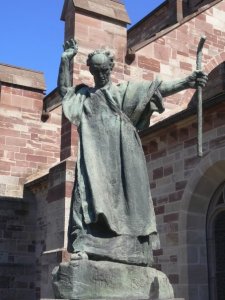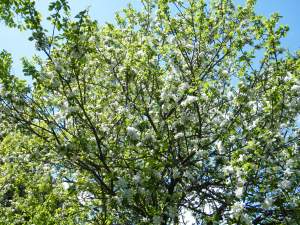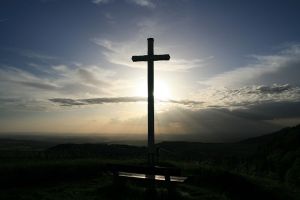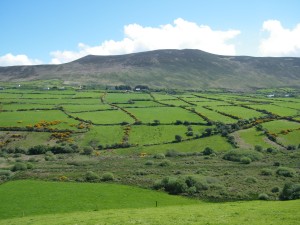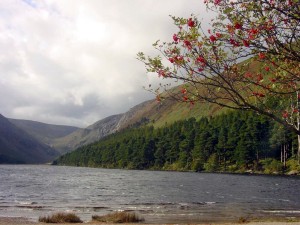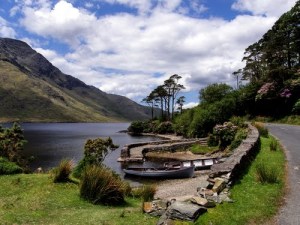“The Seafarer”: An Old English (Anglo-Saxon)Poem
“The Seafarer” is an Anglo-Saxon or Old English poem similar to “The Wanderer” in representing the laments of an exile. Many scholars have described “The Seafarer” simply as an insular sailor’s lamentations, concluding with faith in God’s ultimate mercy; however, many others have associated the poem with the persona of the Christian wanderer, pilgrim, or hermit’s view – one’s ultimate search for God.
Historians have pointed out the emergence of the peregrinus influence of Celtic/Irish Orthodox monks and recluses living in or travelling through early medieval England. This poem may be considered penitential poetry, the motive of exile being penitential in nature; however, a better description might be ascetic, in that exile is pursued as an ascetic exercise, in keeping with the motives of the early medieval Celtic/English Christian hermits and wayfarers.
Historian Dorothy Whitelock thus accurately assesses “The Seafarer” to be “the monolgue of a religious ascetic who has chosen exile on and beyond the sea for the love of God.” – literally, a pilgrimage for the love of God (peregrinatio pro dei amore). F. N. M. Diekstra adds: “Just as the exile feels the persistent urge to travel back to his homeland, the soul, constantly mindful of its origins, attempts to escape from the prison of the body and fly to heaven.” (In Orthodox Christian terms, this is the pursuit of theosis, or deification.)

Many translations of “The Seafarer” exist, but the best by far are those of S. A. J. Bradley, R. K. Gordon and Richard Marsden. The following version amalgamates and modernizes several versions, including those cited.
The Seafarer
Let me speak, in truth, of my life,
tell of toilsome days of travel,
days suffering hardship,
bitterness of heart:
how I endured sorrowful times on ships,
on dreadful rolling seas.
Hard night’s watch at the ship’s prow
was by frequent task,
the ship often tossed along towering cliffs,
afflicted with cold feet, numbed by frost, chill bonds.
My sorrows burned in my heart,
I sighed forth hunger that rent my mind,
I, the sea-weary man.
He who fares so prosperously on land
knows not that I have spent great careworn winters
an exile on the ice-cold sea,
cut off from kin,
hung round with icicles,
hail pelting me in showers,
I heard nothing but the booming sea
and the cold billowing sea-waves.
Sometimes I heard the song of the swan,
seized gladness in the cry of the gannet
and the sound of the curlew, instead of
the laughter of men; in the screaming gull,
instead of the clanking mead-cups.
On the sea, storms beat against the rocky cliffs,
the icy-feathered tern echoed the storm-winds,
as, too, the wing-soaked eagle.
No protector could comfort the heart in need.
He who holds the bliss of life, proud-flushed with wine,
who suffers few hardships in cities, disbelieves
how often in weariness I had to dwell upon the ocean path.
The shadow of night grew dark,
snow flew in from the north,
fast bound the land,
hail, coldest of grains, falling upon the earth.
And yet my heart’s thoughts are stirred
that I should make trial again of the high seas,
of the tossing salt waves.
My heart’s desire exhorts me to venture forth again
and discover the land of strange peoples far hence.
Ah, there is no man on earth so proud,
so generous of gifts,
so bold in youth,
so daring in his deeds,
nor with a lord so gracious unto him,
that he is not always anxious about his seafaring,
as to what God will bestow upon him next.
His thoughts are not of the harp
nor of gift-rings,
nor of the pleasures of a woman,
nor of joy in the world,
nor of aught else but the rolling waves.
Yet he who would set out upon the sea-waters
ever feels longing.
The land puts forth blossoms,
the fields are fair,
the world revives —
but all these urge my eager heart to wandering asea,
proposing to fare far upon ocean paths.
The cuckoo warns with sad cry,
that harbinger of summer sings,
boding bitter sorrow to the heart.
But the man who does not understand,
the prosperous man,
knows not that those endure
who must widely pace the paths of exile.
My heart is restless within me,
my mind is dwelling on the sea-flood,
over the whale’s domain.
My mind fares widely over the face of the earth,
but returns unsatisfied.
The lone-flier screams, urging my heart
to the whale-way over the stretch of seas.
For the joys of the Lord are more inspiring
than this dead fleeting life on earth.
I have no trust that earthly riches
will abide forever.
Three things are bound to visit the doomed and dying,
certain to take life away:
illness, age, or violence.
Left only, then, is the praise of the living who speak
after the dead are gone.
Such is the best of fame after death,
that one should strive before he must depart,
work bold deeds while on earth,
against the malice of demons, against the devil,
so that the children of men may later exalt him,
that his praise live thereafter
among the angels, joy of eternal light.
The days have departed.
The pomps of earth’s kingdom:
kings, emperors, givers of gold,
and not as of yore,
when men wrought great deeds of glory,
and lived in most lordly splendor.
This host has fallen;
their delights have departed;
only the weak live on,
possessing this world only in toil.
Glory is laid low,
the noblest of earth age and wither,
as does every man throughout the world.
Old age befalls him,
his face grows pale,
gray-haired he laments.
He knows that his old friends, sons of princes,
have been laid in the earth.
And when life departs him, too,
his body will neither taste sweetness,
nor feel pain, nor stir a hand,
nor ponder in thought.
Though his grave by kin be strewn with gold,
buried with various treasures beside him,
none of this will go with him.
And what gold he hoarded in life
gives no succor in the face of God’s wrath.
Great is the fear of God, whereby the earth turns.
He established the mighty plains,
the face of the earth, and the sky above.
Foolish is he who does not fear this power.
Death comes to him unexpectedly.
Blessed is he who lives humbly,
mercy comes to him from above.
God establishes that heart in him
because he trusts in God’s strength.
Check a violent mind,
control it with firmness,
be trustworthy to others,
pure in the ways of life.
Let each show moderation,
through the good and through the adverse.
Fate is strong,
but God is mightier than any man’s thoughts.
Consider where we may possess a home, and
think on how we may come to that place, and
strive to attain it: eternal bliss,
where life springs from God’s love,
joy in heaven.
Thanks be to the Holy One, he who has made us worthy, for he is the Prince of glory, the Lord everlasting, forever and ever. Amen.

